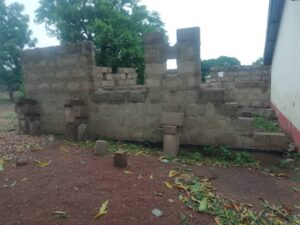Pregnant women deliver in tricycles over difficulty in accessing services
 Some pregnant women at Chaggu, a farming community in the Wa East District, deliver in tricycles on their way to the Bullenga Health Centre for skilled delivery services posing a live-threatening risk to the mother and the unborn baby.
Some pregnant women at Chaggu, a farming community in the Wa East District, deliver in tricycles on their way to the Bullenga Health Centre for skilled delivery services posing a live-threatening risk to the mother and the unborn baby.
This is because there are no maternal healthcare services at the Community-based Health Planning and Services (CHPS) facility at the Chaggu community. This compels pregnant women at that community to either trek or be transported on a motorbike or a tricycle for over 6km on a very deplorable road to Bullenga to receive maternal healthcare services, including skill delivery.
Mr Shahid Abdulai, the Assembly Member of the Chaggu Electoral Area, who revealed this to the Ghana News Agency (GNA) in an interview at the community, recalled that three pregnant women delivered in tricycles while being transported to the Bulenga Health Centre for skill delivery.
“The nurses always complain that our women do not want to deliver at the health facility, but that is not the case.
“When a woman is in labour by the time you get to Bullenga she has already delivered. She can even die in the process because the road is not good,” he explained.
As part of efforts to help mitigate the situation, the community initiated a project to build a maternity room at the Chaggu CHPS to improve access to skilled delivery and other maternal healthcare services for women at the Chaggu community.
Mr Abdulai said several requests had been made to the Wa East District Assembly and the Member of Parliament for the area, Dr. Godfred Seidu Jasaw to assist them to complete the project but nothing positive had been heard from them.
Some women at the community could not hide their frustration from the GNA and said the situation had posed a serious risk to pregnant women at the community considering their difficulty in accessing tricycles in times of emergency.
They, thus, expressed hope that the maternity room would help alleviate the plight of pregnant women when completed and appealed to kind-hearted individuals and organisations as well as the government to assist them to complete the project they had initiated.
Meanwhile, with barely seven years to elapse of the United Nations Sustainable Development Goals, governments of member countries including Ghana that were signatories to the goals were racing to make a significant impact in the achievement of those goals.
It was, however, unclear whether the Ghana would achieve the SDG targets on universal health coverage, because many communities, particularly in the Upper West Region, rarely had access to primary healthcare services owing to factors such as poor road network and unavailability those services at some hard-to-reach communities.
Pregnant women, children, and the aged were the worst affected groups of people as far as difficulty in accessing primary healthcare services was concerned.
It, therefore, behooved the central government, through its decentralized institutions, development partners, and other stakeholders to put hands on deck to remove the geographical barriers in accessing primary healthcare services if the UHC and other health sector targets would be achieved.
Source: GNA
